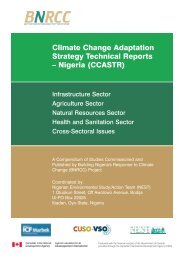BNRCC Project Backgrounder - Building Nigeria's Response To ...
BNRCC Project Backgrounder - Building Nigeria's Response To ...
BNRCC Project Backgrounder - Building Nigeria's Response To ...
You also want an ePaper? Increase the reach of your titles
YUMPU automatically turns print PDFs into web optimized ePapers that Google loves.
<strong>BNRCC</strong> BACKGROUNDERWhat is Climate Change?A region’s climate is the collectiveexpression of the location’smany weather elements: temperature,rainfall, dew, humidity,wind, sunshine, mist, hazeand clouds. The term ClimateChange is used to describe amarked change in the long‐term“average” of a region’s weatherconditions. When we speak ofClimate Change on a globalscale, we are referring tochanges in the climate of theEarth as a whole.A natural system known as theClimate Change is much morethan a warming trend. Mostexperts agree that averageglobal temperatures could riseby 1 to 3.5 degrees Celsius overthe next century. Some of thecurrent and projected climatechanges include the following:retreating Alpine glaciers, a risein sea levels, a shifting of globalWindstorms are already renderingmany Nigerians homeless."greenhouse effect" regulatesthe temperature on Earth. Humanactivities have the potentialto disrupt the balance ofthis system. Heat‐trappingClimate Change Impactsclimatic zones; an increasedincidence and severity of extremeweather; prolonged heatwaves; changes in precipitationlevels leading to increaseddrought, desertification andflooding.As such, Climate Change cancreate a significant loss of foodsecurity, natural disasters, agreenhouse gasses (GHGs) havebeen increasing in our atmospheredue to the burning offossil fuels such as coal and oil,deforestation, and other humanactivities. This has the potentialto warm the planet at a ratethat has never been experiencedin human history. Aninternational scientific consensushas emerged that our worldis getting warmer. SuchClimate Change could have farreachingand/or unpredictableenvironmental, social andeconomic consequences.vanishing of coastlines, humandisplacement, natural resourcedepletion, a lack of clean andaccessible water, animal migration,pest management issues,diseases and other health issues;a loss of cultural practicesand traditional ways of life;economic downturns, energycrises, and more…PAGE 9“Global warming andextreme weatherconditions may havecalamitousconsequences for thehuman rights ofmillions of people.”Kyung‐wha Kang, UNDeputy HighCommissioner forHuman Rights.Who is Most Vulnerable?While Climate Change is aglobal problem, studies haveshown that some countrieshave a greater degree of vulnerabilityto the impact of ClimateChange than others.(IPCC Third and Fourth AssessmentReports).dences of tropical stormscaused by Climate Change.Also, countries with significantlengths of coastline will bemore threatened by sea‐levelrises induced by ClimateChange.Countries with poorly developedinfrastructure, insufficientpublic health systems, and/orCountries within the tropics arelikely to experience more incilowlevels of emergency preparednesswill experience morenegative impacts of ClimateChange.Countries whose economiesand livelihood have a greatersensitivity to climate‐relatedevents such as rainfall, wind(etc.) will be more affected.



![Download [PDF | 6.4MB] - Building Nigeria's Response To Climate ...](https://img.yumpu.com/50509683/1/184x260/download-pdf-64mb-building-nigerias-response-to-climate-.jpg?quality=85)
![Download [PDF | 620KB] - Building Nigeria's Response To Climate ...](https://img.yumpu.com/42187836/1/184x260/download-pdf-620kb-building-nigerias-response-to-climate-.jpg?quality=85)
![Download [PDF | 3MB] - Building Nigeria's Response To Climate ...](https://img.yumpu.com/41338963/1/184x260/download-pdf-3mb-building-nigerias-response-to-climate-.jpg?quality=85)
